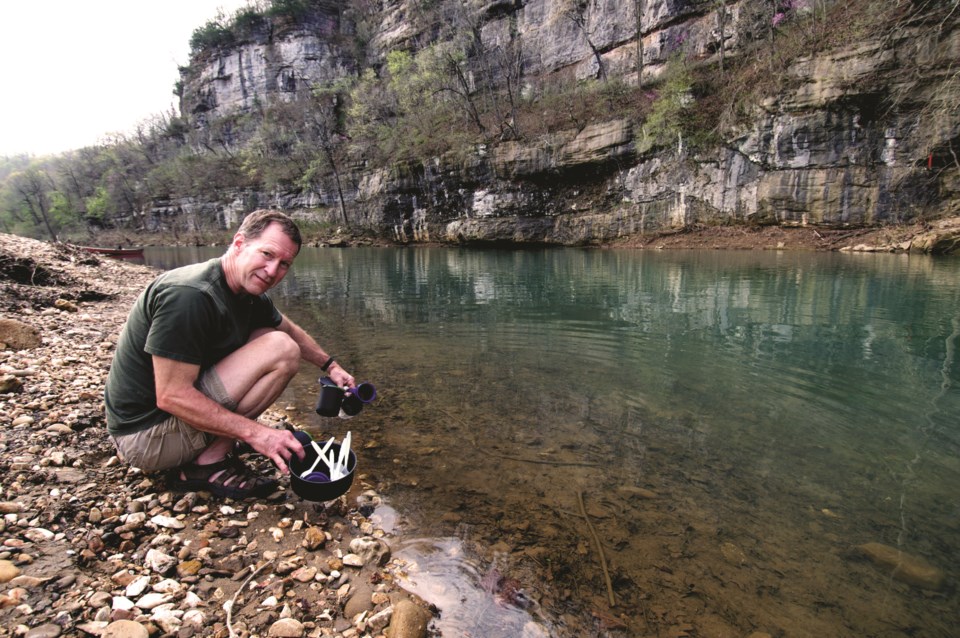“Camping is fun, requires much work...” This down-to-earth observation is from a diary made during the summer of ’63 by one Carl Bernstein and his travelling companion. Yes, that Carl Bernstein—of Bernstein and Woodward, Watergate, and All the President’s Men fame.
At the time, Bernstein was a dictationist and cub reporter in Washington, D.C. with the Evening Star, the yin to the morning Washington Post’s yang, where he’d eventually work with Woodward and change history. He was on a classic road trip with his buddy, Stan, across the States and back through Canada in an off-white Chevrolet Corvair they’d taken the backseat out of to fit in camping gear, Chef Boyardee ravioli and Carl’s guitar. (He’d later buy a banjo in Chicago.)
For all you fellow campers—road trippers and otherwise—Carl’s diary entry will resonate, but the timeframe might not. 1963 was no ordinary year. Soon after Bernstein returned, 250,000 people, led by Harry Belafonte and other civil rights leaders, would March on Washington to hear Martin Luther King Jr., and JFK would be assassinated just months after his eloquent “Ich bin ein Berliner” speech.
Six years later, before the ’70s broke, former Democratic senator and President Nixon’s enlightened advisor, Daniel Moynihan (incidentally, the son of a hard-drinking, Irish newspaperman), wrote his legendary 1969 memo to Nixon describing how the increasing carbon dioxide in the atmosphere created by burning oil, gas and coal would melt glaciers and cause the oceans to rise. It was a message that would be reinforced to Congress years later by NASA’s James Hansen.
So you see, we’ve known for decades and decades that we were headed for some very serious shit, like the heat and drought scorching the planet this spring and summer; last summer; the summers of 2016 and 2020—tied as the hottest years on record. Even the early summer of 1988, when Hansen testified, was unusually hot. All that heat and drought—and all the ensuing fallout: deaths, ecosystem collapse, dying oceans—simply because we’ve been too stubborn, too entrenched, too foolish and foolhardy to get ourselves off fossil fuels.
And what do we do when we get hot? Why, we cool off… with cool, blue water, of course! Drinking it, showering in it, swimming in it, soaking in it—heck, merely looking at it.
Research done by Europe’s BlueHealth consortium concludes that even looking at water refreshes us physically and mentally, much like the benefits from the Japanese practice of “forest bathing” (shinrin-yoku). But New Scientist reports that spending time near “blue spaces”—the ocean, a lake or river, even a swimming pool or fountain—scores even higher in terms of mental and physical well-being. Even better? Places where “blue” and “green” meet, like much of the Sea to Sky and those places where we all like to camp.
But we don’t stop there. Merely looking at water, when we’re camping or otherwise, is just the beginning. After lapping it up and pouring it over ourselves to feel better, we pour it on our pets, our plants and our dusty vehicles after all those road trips.
And so, I gently remind you, me, all of us, dear readers, especially during these hot dry summer months, that that blue stuff is precious. So treasure it!
I remember staying with a family in Tokyo who’d known my great-aunt in Canada. After taking a nice cool shower on a muggy August day, my host gently commented, “Ah, Canadians love water.” My showers became much shorter after that, but he was right. We Canucks love our water and use it like wastrels, even during the Stage 2 restrictions now in effect.
A 2010 study found Whistler’s water use well above average. So if you don’t already have one, check out Home Hardware on Alpha Lake Road for low-flow showerheads. Or Rona just down the way (if they don’t have them in stock, order online and they’ll bring them in). And don’t forget the Re-Use-It Centre on Nesters Road and Re-Build-It Centre in Function Junction. They get in stuff like that, too, occasionally.
Better yet, use water like you’re camping! Yes, it might be a little extra work (see above) but if you treat water like you’ve had to slog a heavy container of it along a rough trail to your campsite—something millions of people have to do every day—we all win.
Stop turning on the tap full-blast just to brush your teeth. (Do we do that because we like the sound, like a creek or fountain?) Rinse your dishes like a camper—in a half cup of water, then give that to your dog. Sponge-bathe more; shower less. Do that old hippie thing and save your rainwater to use all kinds of ways. For there ain’t no cure for the summertime blues when all that water turns out to be limited.
Water shortages are real. The climate disaster is real. So let’s not lose sight of the fact it’s a very good thing indeed that history has been made this summer with the U.S. finally passing its most aggressive climate legislation to date. Legislation so many, many years after Bernstein’s camping adventure and Moynihan’s memo.
As for Bernstein’s road trip, read all about it, and more, in his memoir Chasing History: A Kid in the Newsroom. It’s a fine summer read, plus you’ll learn about one of the most important journalists ever.
As for that 1958 rockabilly hit, “Summertime Blues,” it was co-written and recorded by Eddie Cochran, who was tragically killed at age 21 in an accident when he was on tour in England in 1960.
Who says history is dry and dusty and we can’t learn anything from it?
Glenda Bartosh is an award-winning journalist who uses the same dishwater a couple of times.




.jpg;w=80;h=120;mode=crop)